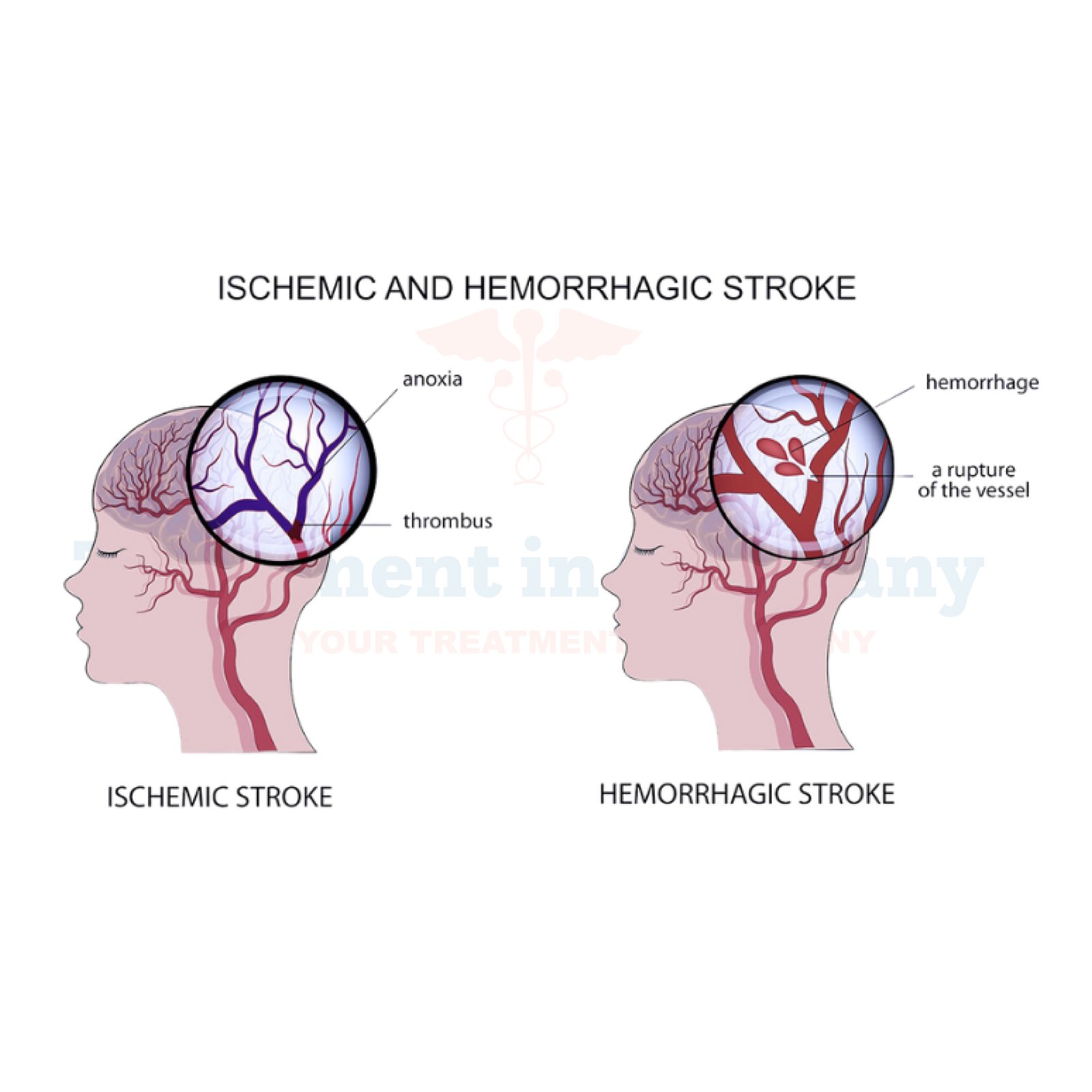A stroke is a medical emergency that occurs when blood flow to the brain is interrupted, either due to a blocked artery (ischemic stroke) or a ruptured blood vessel (hemorrhagic stroke). This disruption deprives brain cells of oxygen and nutrients, causing them to die within minutes. Strokes are a leading cause of disability and death worldwide, but timely medical intervention can significantly improve outcomes. Germany is renowned for its advanced stroke treatment options, offering innovative diagnostic tools, highly trained specialists, and state-of-the-art facilities.
A stroke, also referred to as a “brain attack,” is a condition that affects the brain's ability to function properly. It happens when blood flow to a part of the brain is compromised, leading to severe consequences such as paralysis, speech impairment, or cognitive difficulties. Early recognition and prompt treatment are crucial to minimize brain damage and improve recovery chances.
Strokes are classified into several types based on their cause:
Ischemic Stroke:
Accounts for 87% of all strokes.
Occurs when a blood clot blocks or narrows a blood vessel supplying the brain.
Commonly linked to high cholesterol, diabetes, and high blood pressure.
Hemorrhagic Stroke:
Results from a ruptured blood vessel in the brain, causing bleeding.
Often caused by uncontrolled hypertension or aneurysms.
Transient Ischemic Attack (TIA):
Known as a “mini-stroke,” this is a temporary blockage of blood flow to the brain.
Symptoms resolve within 24 hours but serve as a warning for future strokes.
Cryptogenic Stroke:
A stroke with an undetermined cause despite extensive testing.
Risk Factors for Stroke
Several factors increase the risk of stroke, including:
Unmodifiable Factors:
Modifiable Factors:
Symptoms of Stroke
Recognizing stroke symptoms quickly is critical for immediate medical intervention. Common signs include:
Diagnosis and Diagnostic Tools for Stroke
German hospitals utilize advanced diagnostic tools to quickly and accurately determine the type and severity of a stroke:
Treatment in Germany
Germany stands at the forefront of stroke treatment, offering a comprehensive approach that combines cutting-edge technology, skilled professionals, and innovative therapies. The treatment plan depends on the type and severity of the stroke.
Acute Stroke Treatment
Thrombolysis (Clot-Dissolving Medication):
Administered intravenously to dissolve blood clots during an ischemic stroke.
Time-sensitive: Effective within 4.5 hours of symptom onset.
Endovascular Therapy:
Minimally invasive procedure to remove clots using catheters.
Particularly effective for large artery blockages.
Craniotomy:
Performed during hemorrhagic strokes to relieve pressure and repair ruptured blood vessels.
Long-Term Stroke Management
Physical Therapy:
Aids in regaining mobility and strength.
Tailored rehabilitation programs are provided by experienced physical therapists in German hospitals.
Speech Therapy:
Helps patients recover language and communication skills.
Occupational Therapy:
Focuses on relearning daily tasks and improving quality of life.
Pain Relievers:
Used to manage post-stroke pain and discomfort.
Complementary Therapies:
Acupuncture, massage, and relaxation techniques are integrated to enhance recovery.
Why Choose Stroke Treatment in Germany?
Germany has established itself as a global leader in stroke care for several reasons:
Innovative Treatment in Germany:
Advanced diagnostic tools like MRI and CT scans ensure precise and timely interventions.
Access to the latest medical advancements, including robotic-assisted surgeries.
Hospitals in Germany:
German hospitals are equipped with state-of-the-art facilities, stroke units, and specialized neurorehabilitation centers.
Doctors in Germany:
Renowned for their expertise, German specialists provide world-class care tailored to each patient’s needs.
Comprehensive Care:
Germany offers a holistic approach, integrating medical treatment with rehabilitation and lifestyle changes to prevent recurrence.
Accessibility:
The country’s efficient healthcare system ensures minimal waiting times and seamless care delivery.
Rehabilitation Excellence:
German rehab centers are globally recognized for their innovative programs and personalized care plans.
Conclusion
Stroke is a life-altering condition that requires immediate and comprehensive medical attention. Germany offers some of the world’s most advanced stroke treatments, from acute care to long-term rehabilitation. With its cutting-edge technology, world-class hospitals, and expert specialists, Germany has become a top choice for stroke patients seeking effective and innovative care.
Whether it’s an ischemic stroke requiring clot removal or rehabilitation to regain mobility and independence, German healthcare providers ensure optimal outcomes for every patient. Choosing treatment in Germany means accessing unparalleled expertise and compassionate care, paving the way for recovery and improved quality of life.
👉 Contact us for further information and receive a complimentary consultation.


.webp)
 (1).webp)

.webp)
 (1).webp)


.webp)
 (1).webp)

.webp)
 (1).webp)
